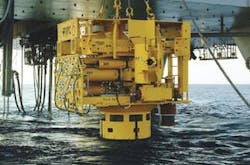Subsea/Surface Systems
Judy Maksoud • Houston
New service optimizes productivity
Schlumberger Oilfield Services took the opportunity at the Offshore Technology Conference in Houston in early May to announced its new Subsea Production Assurance services for optimizing subsea field productivity. The service applies Schlumberger's project management, systems engineering, and technology expertise to the design of integrated, modular subsea systems suited to all phases of field development.
This comprehensive approach ties the reservoir, wellbore, subsea, and surface processing facilities into one complete network that leverages real-time data monitoring and system control from pore to process, Schlumberger says.
Flow surveillance, boosting, and assurance services form the core of Subsea Production Assurance. Flow surveillance provides an open and scalable communications and control network, the company says, compliant with industry standard protocols and ready for both current and next generation subsea and downhole devices, including fiber-optic sensors. Flow boosting ensures optimal use of lifting and pressure boosting technologies to maximize field deliverability. Flow assurance uses advanced fluid sampling and analysis to optimize total productivity from pore to process.
According to Schlumberger, through Subsea Production Assurance services, real-time data acquired from pore to process can be analyzed and modeled to reduce operational risks and to maximize productivity. A newly introduced subsea monitoring and control (SMC) module is intelligent well interface standard (IWIS) compliant, so instrumentation and control modules from Schlumberger and third parties can interact seamlessly. The module can be mounted on a christmas tree or manifold and interfaces with a traditional production control system or operates on a dedicated surveillance communication line to the host.
Schlumberger says two major advantages of a separate surveillance and control system are that its operation does not affect the existing infrastructure, and when desirable, the system can be upgraded without interrupting production.
JIP strives to reduce costs
A new joint industry project is aiming its efforts at lowering intervention costs, particularly in deepwater. The Expro Group has teamed with operators BP, ChevronTexaco, and Shell to develop a solution that reduces costs by 50-75%.
null
Expro has begun developing a remotely operated, self-contained, well maintenance module that is deployed from a conventional ROV support vessel. The company has determined that to enable optimized development of oil and gas reserves being exploited using subsea technology, more user friendly well intervention technologies must be made available.
According to Expro, the key issue in developing such intervention technology is to remove the necessity of a high-cost semisubmersible or drillship and to eliminate the need to build a boat-type vessel to deploy the technology. The objective is to make interventions feasible using a wider spectrum of existing vessels, which should result in significantly decreased costs due to lower vessel day rates.
The plan in place is to provide a full wire-deployable service for mechanical completion, data acquisition, and remediation activities.
FMC completes record installation
FMC Technologies Inc. set a world record for subsea completion installation in early May. The subsea systems on the Shell-operated Coulomb project in the Gulf of Mexico were set at 7,600 ft.
Transocean's ultra-deepwater semisubmersible Deepwater Nautilus carried out the subsea completion. Interestingly, the new water-depth record eclipsed one previously held by Transocean's Discoverer Spirit, also set in the US GoM at 7,209 ft water depth.
Setting the subsea tree is part of a two-well subsea tieback to the Na Kika project in Mississippi Canyon block 613. The Deep-water Nautilus team completed the first well, Coulomb C-2, in 13 days, then began work on the second well, Coulomb C-3.
FMC Technologies also supplied the subsea systems for the Na Kika project, which is co-owned by Shell and BP.
In 1996, Shell and FMC formed a subsea alliance to develop projects within Shell's deepwater portfolio. The alliance was founded on the concept of engineering standardized products that could be integrated into a wide variety of systems used to develop multi-well subsea projects. The Coulomb project uses the standard vertical subsea tree completion system developed through the alliance.
"The subsea tree for the Coulomb project was one of 47 manufactured last year in our Houston facility, which focuses on serving the Gulf of Mexico," said Peter D. Kinnear, executive vice president FMC technologies. "This milestone was made possible through our subsea alliance and close working relationship with Shell."

